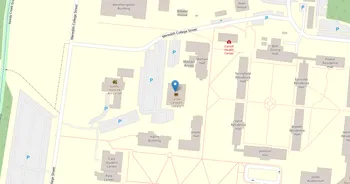Mars Hill University : Overview, Courses, Scholarships & Rankings
About Mars Hill University
Set in the Blue Ridge foothills, Mars Hill University pairs a liberal-arts core with practical learning. It has a reputation for close faculty attention and strengths in the arts, education, health fields, business, and environmental study. Students find well-equipped labs and studios, a library, performance spaces, and support through advising, tutoring, and counseling.
Life here tilts outdoors. Trails and rivers are close, while clubs, arts, service projects, and campus athletics keep weeknights lively. The culture feels friendly and grounded. Career prep leans on internships with regional schools, nonprofits, and employers. And nearby Asheville offers creative energy and ways to plug into the community. Traditions highlight Appalachian heritage and gatherings that turn strangers into neighbors.
Key Institutional Details
Contact & Profile
Academic & Institutional
Academic Programs & Fields of Study
Mars Hill University offers 27 degree programs across 14 major academic fields, graduating approximately 241 students annually. The most popular fields by graduate volume are Business (2 programs, 70 graduates), Security & Safety (1 programs, 25 graduates), Biological Sciences (3 programs, 24 graduates), Education (4 programs, 19 graduates) and Psychology (1 programs, 18 graduates). Explore program details, award levels, and graduate demographics below.
Business (2 programs, 70 graduates)
Business Administration, Marketing and Entrepreneurship
| Program Name | Graduates | Gender Distribution | Award Levels | CIP Code |
|---|---|---|---|---|
| Business Administration and Management | 68 |
|
Bachelor's
Master's
|
52.0201 |
| Fashion Merchandising | 2 |
|
Bachelor's
|
52.1902 |
Security & Safety (1 programs, 25 graduates)
Emergency Management, Law Enforcement and Public Safety
| Program Name | Graduates | Gender Distribution | Award Levels | CIP Code |
|---|---|---|---|---|
| Criminal Justice Administration | 25 |
|
Bachelor's
Master's
|
43.0103 |
Biological Sciences (3 programs, 24 graduates)
Life Sciences, Biotechnology and Biomedical Research
| Program Name | Graduates | Gender Distribution | Award Levels | CIP Code |
|---|---|---|---|---|
| Zoology and Animal Biology | 13 |
|
Bachelor's
|
26.0701 |
| Biology and Biological Sciences | 10 |
|
Bachelor's
|
26.0101 |
| Biological and Biomedical Sciences | 1 |
|
Bachelor's
|
26.9999 |
Education (4 programs, 19 graduates)
Educational Sciences, Teaching Methods and Pedagogy
| Program Name | Graduates | Gender Distribution | Award Levels | CIP Code |
|---|---|---|---|---|
| Music Teacher Education | 10 |
|
Bachelor's
Master's
|
13.1312 |
| Elementary Education | 5 |
|
Bachelor's
|
13.1202 |
| Special Education Teaching | 2 |
|
Bachelor's
|
13.1001 |
| Secondary Education and Teaching | 2 |
|
Master's
|
13.1205 |
Psychology (1 programs, 18 graduates)
Psychological Sciences, Mental Health and Behavioral Studies
| Program Name | Graduates | Gender Distribution | Award Levels | CIP Code |
|---|---|---|---|---|
| General Psychology | 18 |
|
Bachelor's
|
42.0101 |
Health (2 programs, 18 graduates)
Healthcare Professions, Medical Sciences and Clinical Practice
| Program Name | Graduates | Gender Distribution | Award Levels | CIP Code |
|---|---|---|---|---|
| Registered Nursing | 14 |
|
Bachelor's
|
51.3801 |
| Art Therapy | 4 |
|
Bachelor's
|
51.2301 |
Kinesiology (2 programs, 17 graduates)
Exercise Science, Sports Medicine and Physical Recreation
| Program Name | Graduates | Gender Distribution | Award Levels | CIP Code |
|---|---|---|---|---|
| Sports, Kinesiology, and Physical Education | 12 |
|
Bachelor's
|
31.0501 |
| Parks, Recreation, and Leisure Studies | 5 |
|
Bachelor's
|
31.0101 |
Public Services (2 programs, 15 graduates)
Public Administration, Social Work and Community Services
| Program Name | Graduates | Gender Distribution | Award Levels | CIP Code |
|---|---|---|---|---|
| Social Work | 11 |
|
Bachelor's
|
44.0701 |
| Public Administration | 4 |
|
Bachelor's
|
44.0401 |
Arts (4 programs, 14 graduates)
Fine Arts, Design Studies and Creative Performance
| Program Name | Graduates | Gender Distribution | Award Levels | CIP Code |
|---|---|---|---|---|
| Theatre Arts | 5 |
|
Bachelor's
|
50.0501 |
| Musical Theatre | 3 |
|
Bachelor's
|
50.0509 |
| Studio Arts, General | 3 |
|
Bachelor's
|
50.0702 |
| Music Performance | 3 |
|
Bachelor's
|
50.0903 |
Computer & IT (1 programs, 6 graduates)
Computer Science, Information Technology and Cybersecurity
| Program Name | Graduates | Gender Distribution | Award Levels | CIP Code |
|---|---|---|---|---|
| Computer and Information Sciences | 6 |
|
Bachelor's
|
11.0101 |
Admission Requirements & Test Scores
Comprehensive overview of admission criteria, standardized test score ranges, and application requirements for prospective students at Mars Hill University.
Application Requirements
Data based on IPEDS for 2022-2023 academic year. Test score ranges represent the middle 50% of admitted students (25th-75th percentile). Requirements may vary by program.
Tuition, Fees & Estimated Costs
Overview of tuition rates, housing, and other annual education expenses for undergraduate and graduate students
Financial Aid & Student Support
Summary of scholarships, grants, student loans, and financial aid statistics for undergraduate students
Student Success Metrics
Graduation rates and post-graduation earnings to help assess student outcomes and long-term value of education.
Loan Burden & Repayment Outcomes
Breakdown of loan repayment rates and student debt levels by income and dependency status.
Frequently Asked Questions
Find answers to the most common questions about Mars Hill University
How much does it cost to attend Mars Hill University?
The annual tuition at Mars Hill University is $37,270 for in-state students. When including room and board, books, and other expenses, the total estimated cost is approximately $50,498 for in-state students. Additional costs include room and board $10,228 (on) / $8,456 (off) .
Data based on IPEDS program completions for 2022-2023 academic year. Tuition and cost estimates are approximate and may not include all fees, personal expenses, or transportation costs.
What academic programs and degree levels does Mars Hill University offer?
Mars Hill University offers 27 academic programs across 14 major fields of study, with available degree levels: Bachelor's, Postbac Cert., Master's, Other Award.
Most popular program areas include:
- Business Administration, Marketing and Entrepreneurship (2 programs)
- Emergency Management, Law Enforcement and Public Safety (1 programs)
- Life Sciences, Biotechnology and Biomedical Research (3 programs)
- Educational Sciences, Teaching Methods and Pedagogy (4 programs)
- Psychological Sciences, Mental Health and Behavioral Studies (1 programs)
Data based on IPEDS program completions for 2023-2024 academic year. Numbers reflect programs where students graduated, not all offered programs.
What is the acceptance rate for Mars Hill University?
Mars Hill University has an 77.9% acceptance rate and a 29.3% yield rate, making it selective.
Admission statistics breakdown:
- Total applicants: 1,393
- Students admitted: 1,085
- Students enrolled: 318
Data based on IPEDS for 2022-2023 academic year. Admission statistics may vary by program and application cycle.
What financial aid and scholarships are available at Mars Hill University?
Mars Hill University provides financial aid to 25% of first-time, full-time students, with average grants of $28,914 and average loans of $8,564.
Average financial aid amounts by type:
- Pell grants: $5,065
- State/Local grants: $6,312
- Institutional grants: $24,536
- Federal loans: $5,335
The university supports 241 students with grants and 165 students with loans annually.
Data based on IPEDS for 2022-2023 academic year. Financial aid amounts and percentages may vary by program, enrollment status, and individual circumstances.
What is the average salary for Mars Hill University graduates?
Mars Hill University graduates earn a median salary of $35,680 after 6 years and $44,781 after 10 years.
The salary range 10 years after graduation spans from $29,922 (25th percentile) to $60,021 (75th percentile), with top earners reaching $61,800 (90th percentile).
Data based on IPEDS for 2022-2023 academic year. Salary data reflects graduates who received federal financial aid (approximately 60% of all graduates). Actual earnings may vary significantly based on program, location, and individual circumstances.
Related Universities




Found something useful? Help others discover it too! Share with friends, on social media, or save for later - every share helps someone find the information they need.